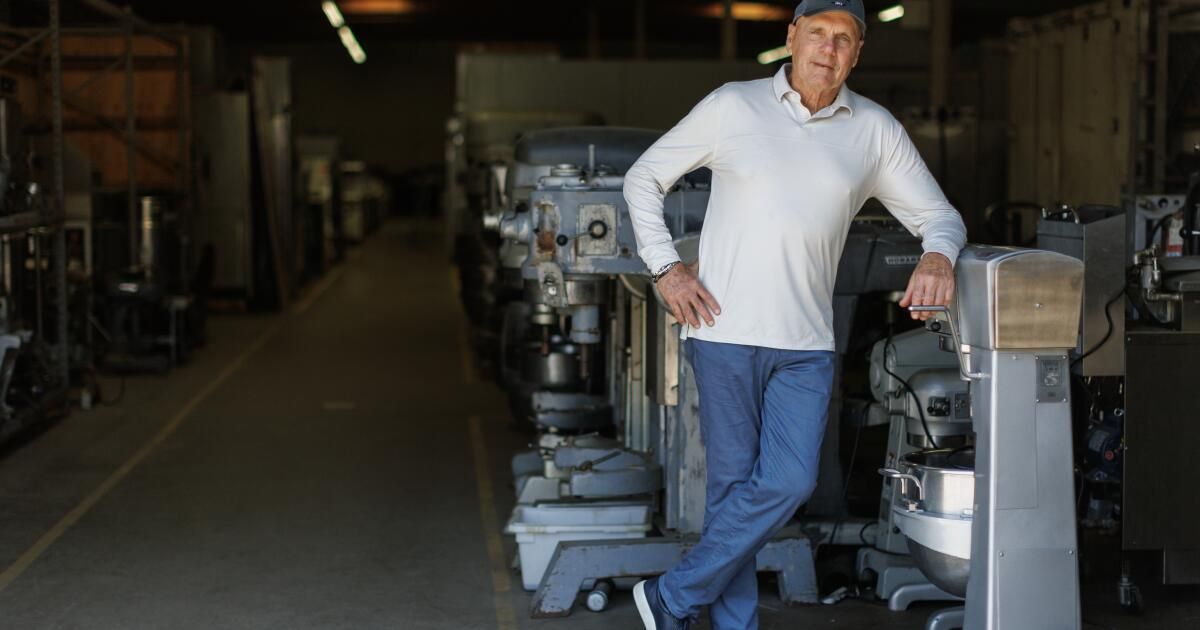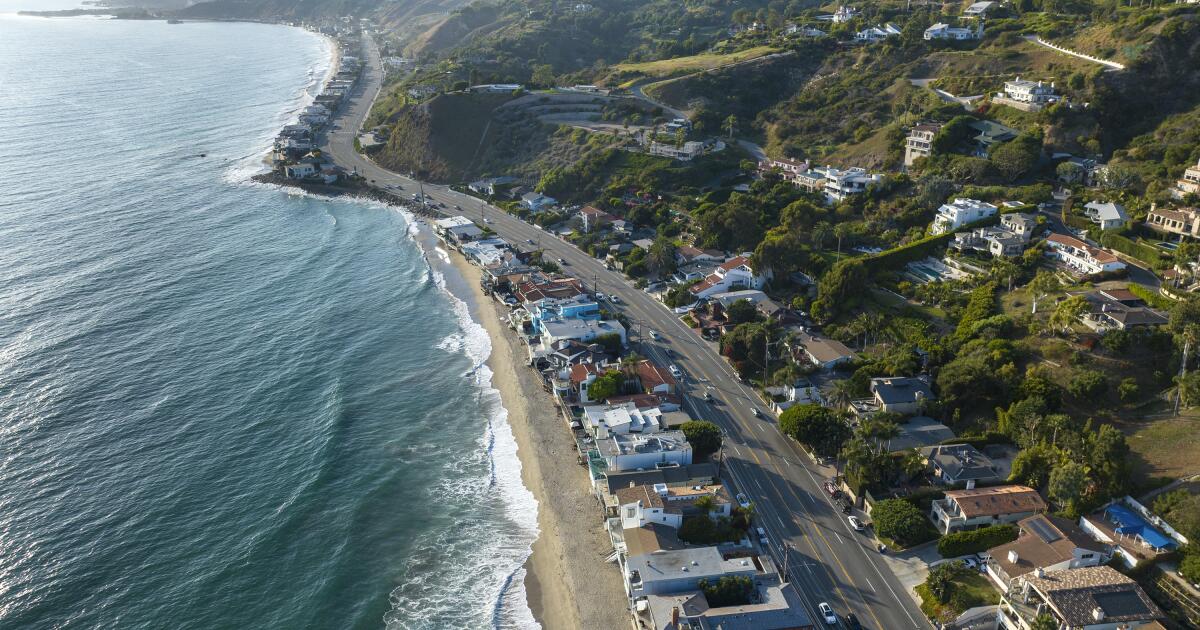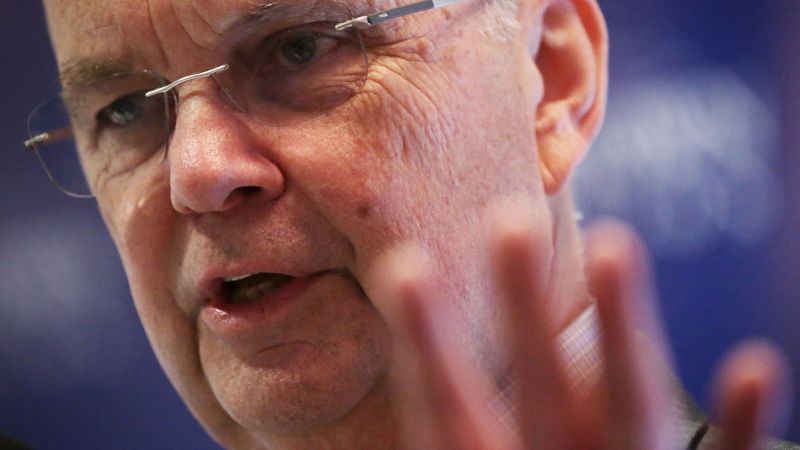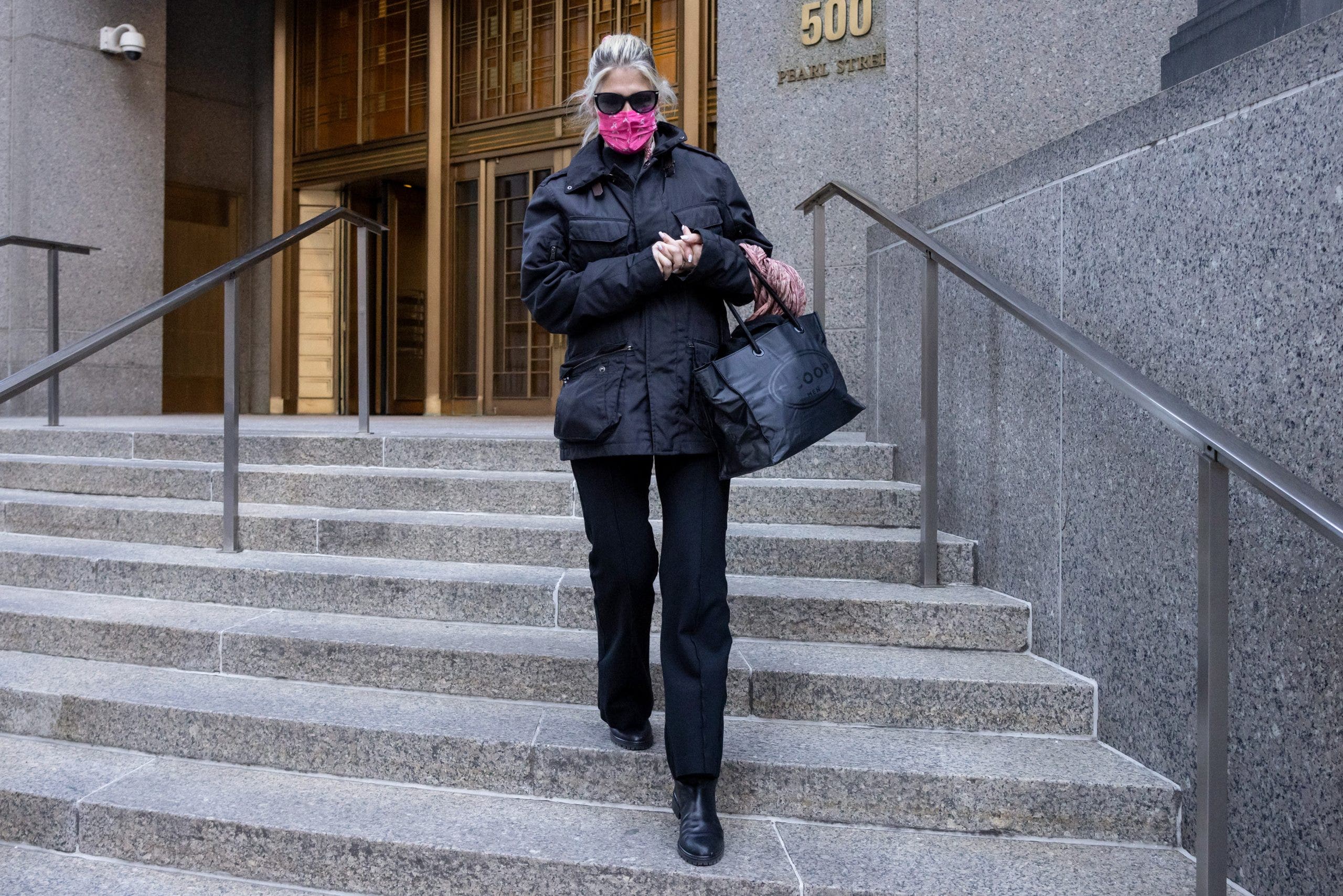Fred Bush walked through the run-down pizzeria and behind the counter, where a huge oven sat idle in the pre-lunchtime gloom. He opened the door and peered inside.
“That’s the stone you put the pizza on,” he explained. “You have to make sure the stones aren’t broken.”
As Bush inspected the Inland Empire restaurant's equipment (a mixer, a meat slicer and more), the owner explained why he planned to close the pizzeria.
Like many other Southland restaurant owners who have struggled in recent years, his business had been hit by a number of issues: Delivery service fees cut into revenue, diners were spending less, good employees left for higher-paying jobs, and the landlord of the outdoor shopping center where he had operated since 2019 was unwilling to renegotiate the lease.
The man, who asked that he and his restaurant not be identified for privacy reasons, said he was working seven days a week, handling everything from cooking to delivery, but was not making a profit.
“This is very normal,” Bush told the owner. “You just realize that no matter what I do, I’m not going to make any money.”
Fred Bush & Associates in Corona offers reconditioned mixers for sale.
(Gina Ferazzi/Los Angeles Times)
The owner was grateful that Bush understood.
“It is a difficult matter, very difficult,” he intoned as he left.
A restaurant closing is almost universally viewed as bad news, but not necessarily from Bush's perspective, since he is in the business of selling used equipment and furniture, buying stoves, sinks, shelves and the like from owners who have thrown in the towel. His Corona-based company, Fred Bush & Associates, meticulously refurbishes items and sells them at deep discounts from original retail prices. Recent clients include Cobi's in Santa Monica, Ca' Del Sole in Toluca Lake and Brentwood's Italian spots Toscana and Divino. He has also worked with chains such as Starbucks and Rubio's Coastal Grill.
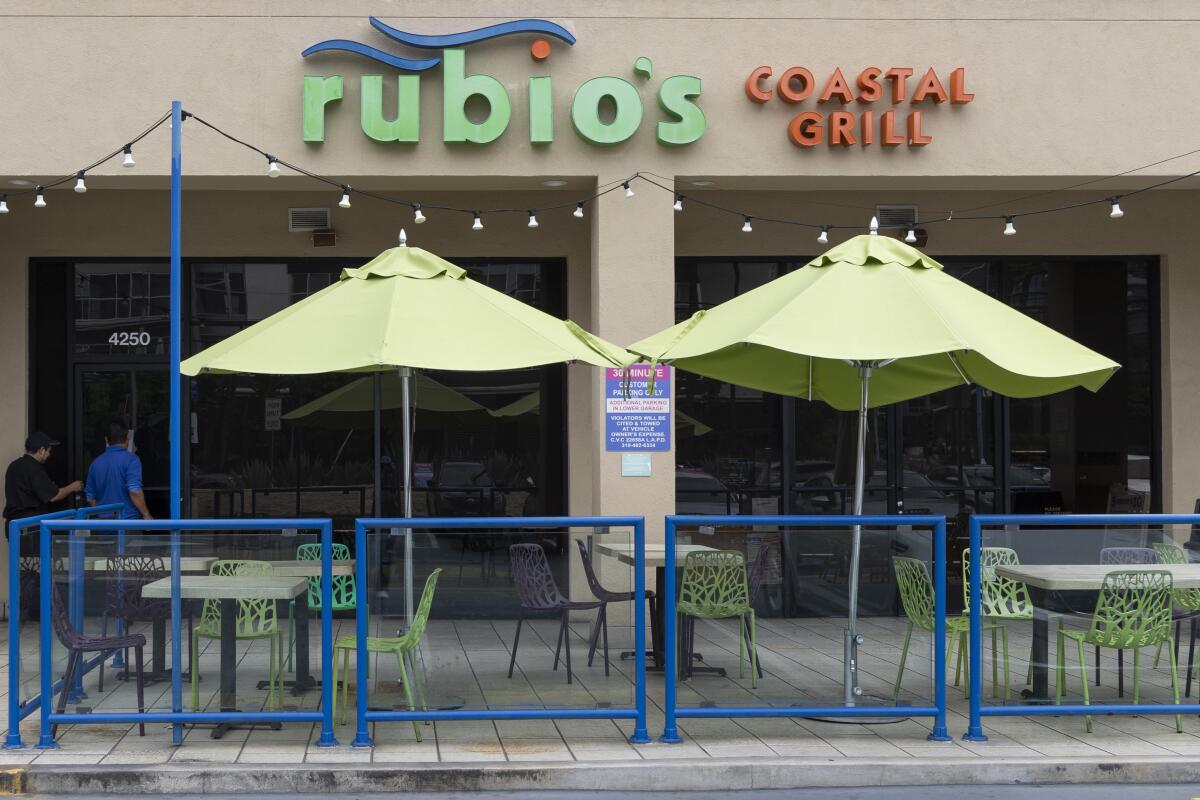
Rubio's Costal Grill, a Fred Bush client, said in June it would close nearly 50 locations.
(Zoe Cranfill/Los Angeles Times)
These days, the restaurant drought is, in some ways, a blessing for Bush: His 26,000-square-foot showroom is bursting with merchandise.
“We literally get a call a day from a restaurant that’s closing,” said Bush, 76, explaining that he’s running out of space in his warehouse. “I never turn down anything good.”
Bush, who has worked in the industry for more than 40 years, prefers to focus on the positive as he makes painful visits to restaurant owners in crisis: The products he buys and then sells help people pursue their entrepreneurial dreams.
“It's a tough business because you're catching people at their worst, but you're in it to make money,” said Kevin Lanouette of KL Kitchen Supplies, a supplier of new restaurant equipment based in Canyon Lake, California.[Bush’s] The treatment of the patient has to be good. It is not something I would like to do.”
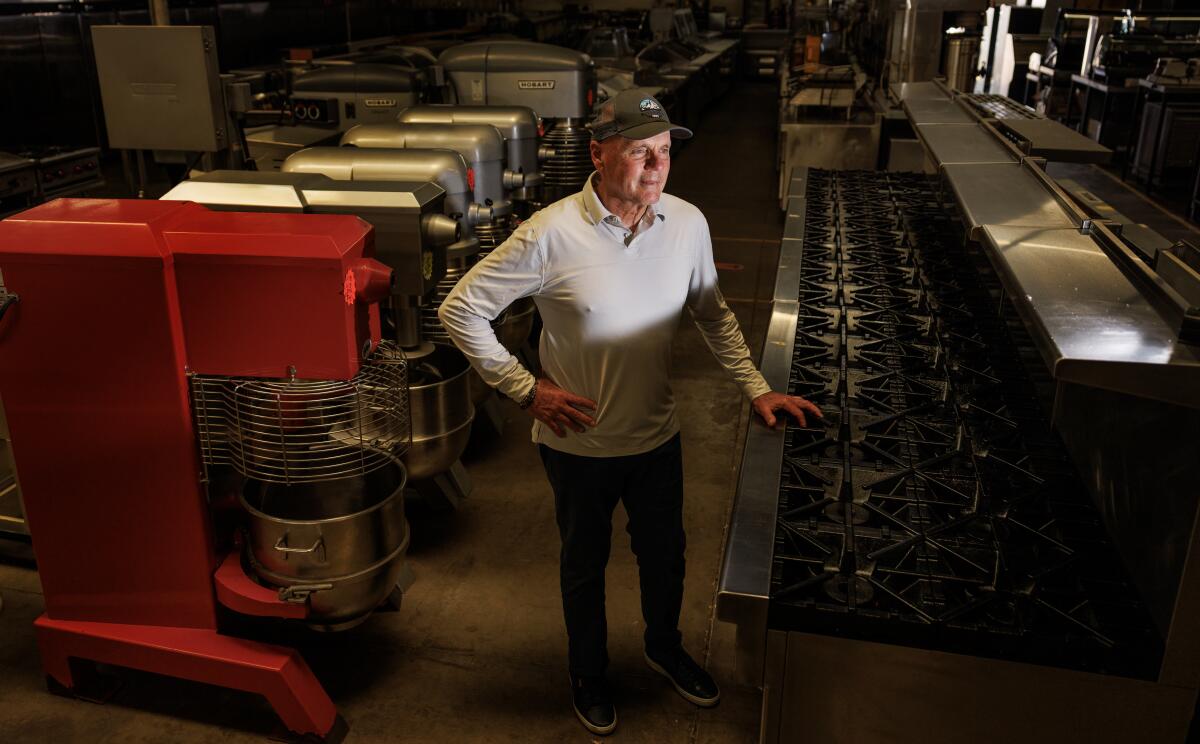
Fred Bush's Corona showroom is packed with used restaurant equipment.
(Gina Ferazzi/Los Angeles Times)
Bush said that when he meets with the owners, they are often in good spirits, glad that their ordeal is coming to an end. And he enjoys that part of the job. But the Inland Empire pizza maker didn't seem to be at ease. Still, Bush remained steadfast in his belief that the man would soon find peace. Bush ultimately offered $4,500 for most of his equipment, about 30 items in all.
He estimated the items had cost the owner at least $75,000. Once restored, Bush would put them up for sale for a total of about $15,000.
As of mid-July, the man had not agreed, Bush said, and no one was answering the phone at the pizzeria.
'Practically new'
Bush's business is a key cog in the Southern California restaurant industry — people who work in the space said they didn't know of any other used equipment dealers on his level.
He grew up in West Los Angeles and got into business in 1976, working with a partner to buy used restaurant equipment at auctions and resell it. But the partnership was not a good one and he went out on his own in 1982.
Two years later, organizers of the Los Angeles Olympics asked Bush to dismantle five makeshift kitchens that had been built around the region to feed competing athletes. Bush bought the equipment and was able to resell it quickly, in part because of its pristine condition.
“Everything was two weeks old,” Bush said.
Not everything that passes through his warehouse doors arrives so clean. In fact, much of the equipment is dirty. But Bush prides himself on refurbishing products to make them look “practically new.”
Many items sell for less than half their retail price and come with a 30-day warranty. Bush, for example, recently listed a Montague Co. convection oven for $9,500, well below its original price of about $21,000. He said he paid about $2,500 for it.
On a recent visit to his company's facility, Bush pointed out the booth where equipment is repainted and a sheet metal shop where stainless steel parts are fabricated. Everything is disassembled, cleaned and rebuilt as needed. A Hobart mixer that was ready to be delivered to a customer gleamed next to a row of the same model that had not yet been repaired. They were covered in grease and grime.
“We completely overhauled everything,” Bush said.
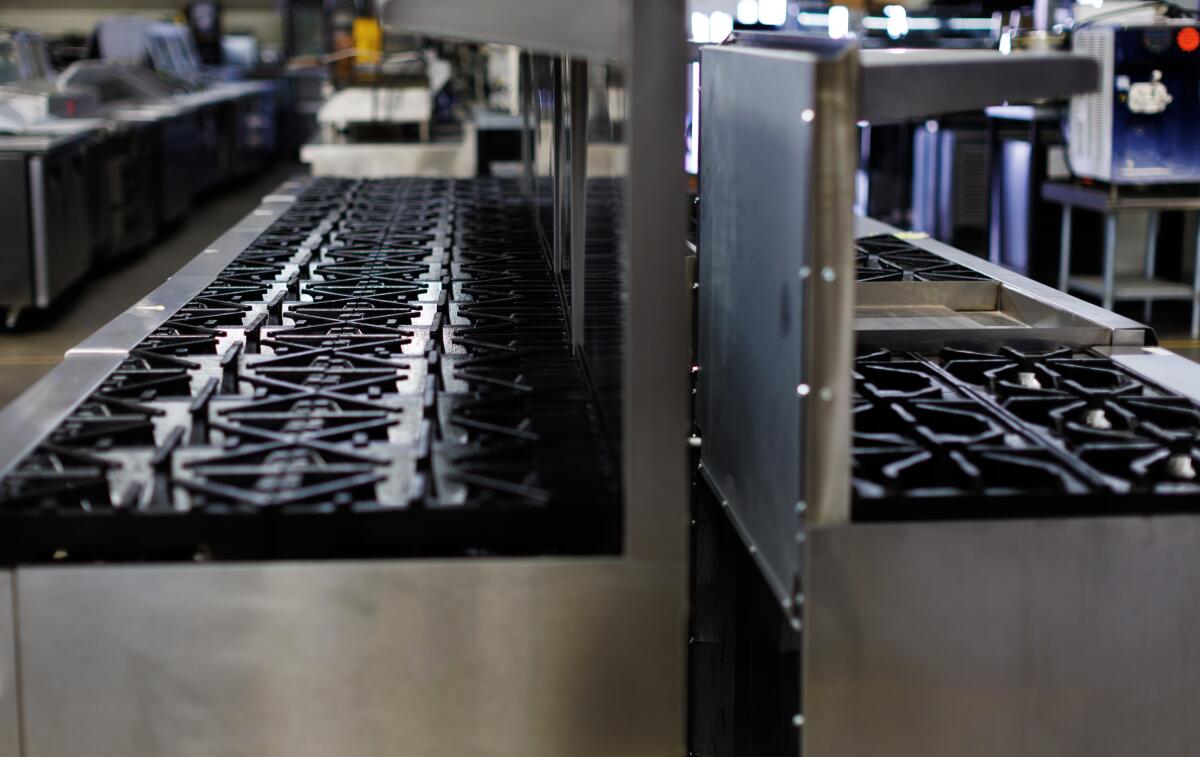
Refurbished ranges in the Fred Bush showroom.
(Gina Ferazzi/Los Angeles Times)
Joaquin Caldera, vice president of Fred Bush & Associates, has worked for the company since 1991 and is one of the main reasons the company can bring almost any piece of failing equipment back to life, Bush said. The walls of Caldera's office are covered with dozens of clear bags filled with parts from equipment he works on regularly, a testament to Bush's boast that Caldera “can fix anything.”
George Qualls, operations manager for a barbecue restaurant company, recently worked with Bush to equip a handful of the chain's locations in San Diego County.
But the first time Qualls saw the sorry state of the equipment Bush had brought with him—specifically, a filthy grille—he was stunned.
“He showed it to me, gave me a price, and I said, ‘Really, Fred?’” Qualls recalled. “And he said, ‘No, no, it’s not going to look like that. ’ I came back four days later and it looked like a brand new rig. It was crazy.”
Qualls bought the grill for $550, about a quarter of what it would have cost new.
Dedicated to diners
Bush lives and breathes restaurants: he invests in them and is friends with the owners.
He said he has even furnished the homes of his two adult children with used restaurant furniture. They benefited, he said, when Starbucks closed stores about a decade ago and had to get rid of armchairs, coffee tables and sofas.
“My kids would want to see what we bought at Starbucks and put it in their homes,” she said. “Most of the stuff… was [like] new.”
Bush often travels to visit places that are closing and evaluate their equipment. He logs a lot of miles: In a two-day span in June, he went from Upland to Brentwood and then to Lake Forest. Some of the visits are purely joyful: Bush also buys equipment when restaurants are remodeling or expanding.
Still, he regularly visits struggling establishments, sometimes before plans to close are announced. So he can know the fate of a restaurant before its employees or the public do.
In fact, Bush said that days before Rubio's announced in June that it would close 48 restaurants in California, he had visited a location at the company's request to conduct a study on the equipment it would purchase.
He now has a few chairs from the chain for sale, available for $20 each.
Dreaming in a bear market
During a tour of Bush's Corona showroom, a handful of potential customers perused aisles lined with mostly stainless steel equipment gleaming under fluorescent lights: refrigerators, convection ovens, steam kettles, deep fryers, griddles, blast freezers, ice makers, stoves, grills, mixers, coffeemakers, dishes, utensils, tables, chairs and more.
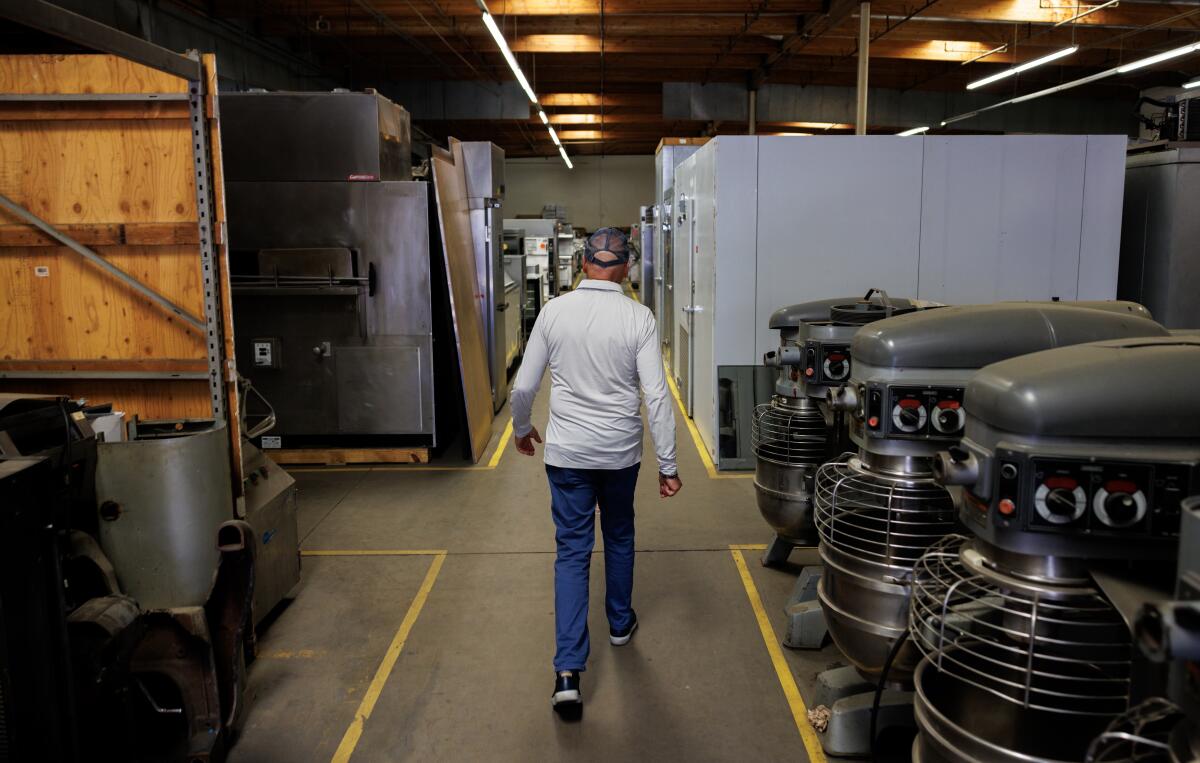
Fred Bush has been in the used restaurant equipment business for over 40 years.
(Gina Ferazzi/Los Angeles Times)
Bush pointed to a huge piece of decorative wood he had purchased at a Japanese restaurant in South Coast Plaza. He had been having trouble selling it. “It probably weighs 500 pounds,” he said.
He then ran into Sam Harris, co-owner of Sherman's Deli & Bakery in Palm Springs. He had recently purchased an ice machine from Bush and had come back to check out the ovens.
“I always come here and come out with something,” Harris said.
In a tough economy, repeat customers — especially those who already own restaurants — are key. While the current restaurant climate has helped Bush increase his inventory, it also means fewer new restaurants are opening, which translates to lower sales.
Lanouette, whose clients include Republique and the Hotel Bel-Air, said that when the projects he works on require used equipment, he gets it from Bush. And in today's economy, when speed is key, reconditioned products often do the trick.
“Times are what they are… the important thing is to open the doors and invest money again… [a restaurateur’s] “Money is very important to me,” Lanouette said. Bush’s merchandise is “very helpful to a lot of my customers who don’t have a lot of money but have a dream.”
There will always be people who pursue the dream of opening a restaurant. Bush believes it's something innate in some people: they just want to feed others.
“They have to keep trying,” he said. “And ultimately, we all have to eat.”

